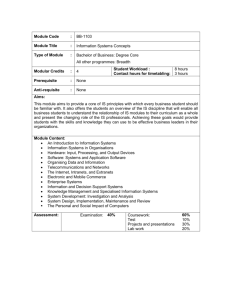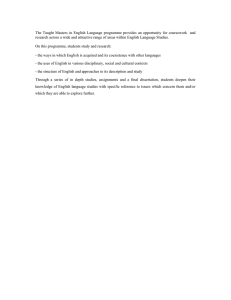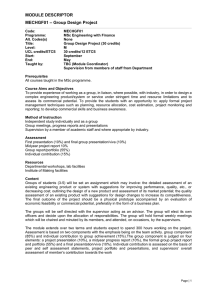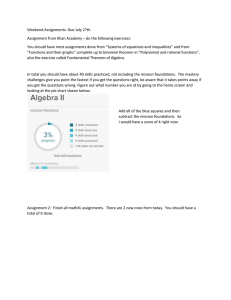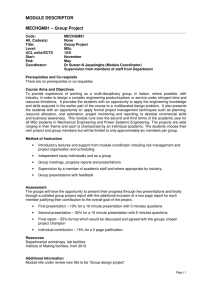MODULE DESCRIPTOR COMPGF03– Compliance, Risk and Regulation
advertisement
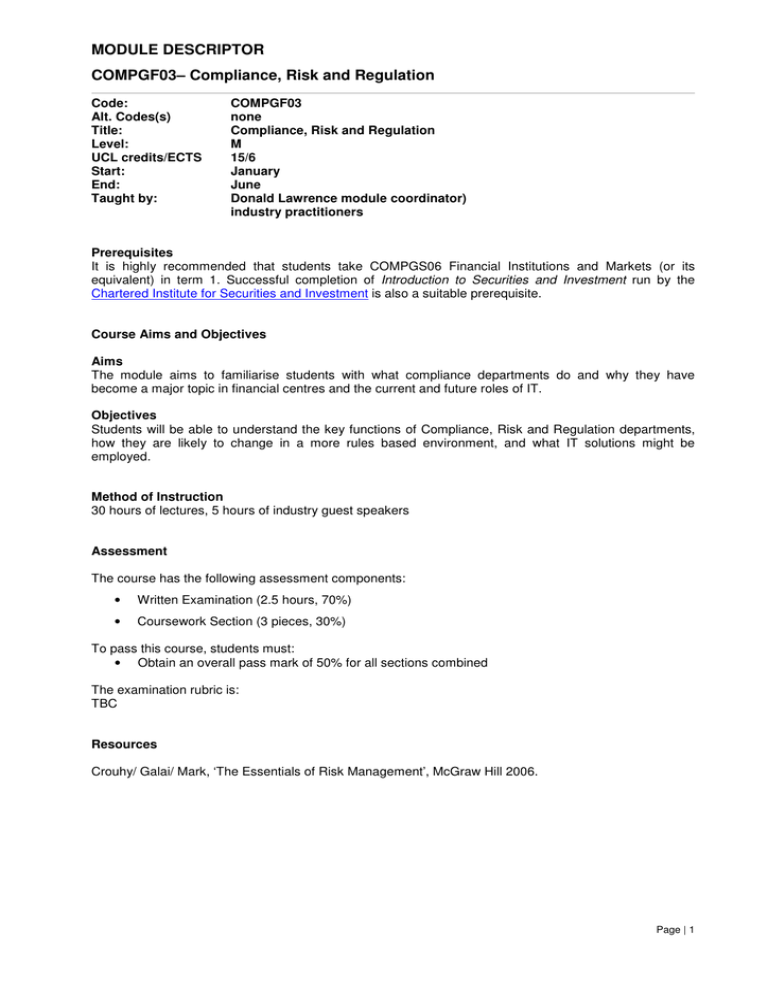
MODULE DESCRIPTOR COMPGF03– Compliance, Risk and Regulation Code: Alt. Codes(s) Title: Level: UCL credits/ECTS Start: End: Taught by: COMPGF03 none Compliance, Risk and Regulation M 15/6 January June Donald Lawrence module coordinator) industry practitioners Prerequisites It is highly recommended that students take COMPGS06 Financial Institutions and Markets (or its equivalent) in term 1. Successful completion of Introduction to Securities and Investment run by the Chartered Institute for Securities and Investment is also a suitable prerequisite. Course Aims and Objectives Aims The module aims to familiarise students with what compliance departments do and why they have become a major topic in financial centres and the current and future roles of IT. Objectives Students will be able to understand the key functions of Compliance, Risk and Regulation departments, how they are likely to change in a more rules based environment, and what IT solutions might be employed. Method of Instruction 30 hours of lectures, 5 hours of industry guest speakers Assessment The course has the following assessment components: • Written Examination (2.5 hours, 70%) • Coursework Section (3 pieces, 30%) To pass this course, students must: • Obtain an overall pass mark of 50% for all sections combined The examination rubric is: TBC Resources Crouhy/ Galai/ Mark, ‘The Essentials of Risk Management’, McGraw Hill 2006. Page | 1 Content 1. Foundations of the compliance environment • Present the foundations of the compliance environment in a financial institution or financial department of a firm. • Examine what accounting and legal governance consider best practice, and what key functional roles are carried out, and the role of IT in these functions. 2. Market, credit and operational risk. • Examine the definitions, the key organisational rules, reporting structure, the best practice types of calculations, the regulatory requirements. 3. Organisations • Major regulatory organisations in the US, UK, EU and Japan, their individual responsibilities, overlapping coverage, and what might slip through that overlap structure. • What are regulators trying to do as the ratings agencies are accused of allowing the current collapse to occur? 1 Learning Outcomes for COMPGF03 Compliance, Risk and Regulation General Learning Outcomes Ability to develop, monitor & update a plan, to reflect a changing operating environment N/A Ability to monitor and adjust a personal program of work on an on-going basis, and to learn independently Students are expected to manage their program of study, learn independently in order to produce three written coursework assignments to given deadlines. The ability to exercise initiative and personal responsibility, which may be as a team member or leader N/A The ability to learn new theories, concepts and methods etc and apply these in unfamiliar situations Normal learning situation common to all degree programs Specific Learning Outcomes Underpinning science & Mathematics A comprehensive understanding of the relevant scientific principles of the specialisation N/A. A critical awareness of current problems and/or new insights much of which is at, or informed by, the forefront of the specialisation. N/A. An understanding of concepts relevant to the discipline, some from outside engineering, and the ability to critically evaluate and apply them effectively. Students are expected to develop an understanding of compliance, regulation and risk management concepts and learn how to apply them through coursework assignments. 1 EAB website http://www.engab.org.uk/documentation document Accreditation Of Masters Degrees Other Than MEng last accessed 10 Aril 2012 Page | 2 Engineering Analysis Ability to use fundamental knowledge to investigate new and emerging technologies N/A Ability to apply appropriate models for solving problems in engineering and the ability to assess the limitations of particular cases; N/A The ability to collect and analyse research data and use appropriate engineering tools to tackle unfamiliar problems, such as those with uncertain or incomplete data or specifications, by the appropriate innovation, use or adaptation of engineering analytical methods. N/A Design The ability to apply original thought to the development of practical solutions for products, systems, components or processes N/A Economic, Social and Environmental Context Knowledge and understanding of management and business practices, and their limitations, and how these may be applied appropriately, in the context of the particular specialisation The course provides the students with knowledge and understanding of the compliance and regulatory frameworks of financial institutions and accounting and legal governance best practises and gives them the opportunity to apply this knowledge through written assignments. The ability to make general evaluations of risks through some understanding of the basis of such risks The students are expected to develop an understanding of market, credit and operation risks involved in financial institutions and be able to apply best practise calculations to evaluate these risks. Engineering Practice A thorough understanding of current practice and its limitations, and some appreciation of likely new developments N/A Advanced level knowledge and understanding of a wide range of engineering materials and components N/A The ability to apply engineering techniques taking account of a range of commercial and industrial constraints N/A Page | 3
